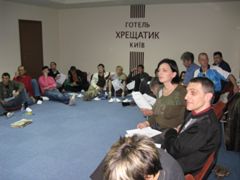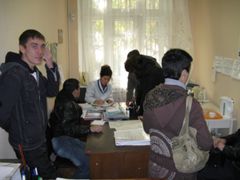
Meeting with the Russian Delegation
A few days ago activists from the harm reduction [1] movement in Russia visited Kiev to learn from their Ukrainian colleagues – leaders from the community of people living with drug addiction [2], and representatives of the Association of Substitution Therapy Participants. The main event of the meeting was a visit to one of Kiev’s methadone substitution therapy sites. Blogger mimozza described the visit on the Drop-in Center blog [3].
In Ukraine the government and health care authorities have supported substitution therapy [4] programs as a way of decreasing the spread of HIV, but the Russian government has rejected the public health program, citing a belief that replacing one drug with another can’t be considered medical treatment. For many years Russian harm reduction activists have been fighting for the legalization of methadone programs, but have yet to achieve any noticeable results.
Mimozza goes on to describe [5]her first impressions of meeting the Russian delegation of substitution therapy activists:
It seemed that it was a meeting of two separate worlds. One world was one reality, the other was its mirrored reflection. In Russia, even combining the words “harm reduction” is considered to be a crime; something that discredits the dignity of “hard working Russian people”…
After listening of many horrifying stories from Russia we desperately wanted to show the guests something which is not yet attainable for them – how substitution therapy works in practice. So we took them to the methadone site.
At the beginning the group was not received well on the site. Mimozza explains:

On the metahdone site
We went to the methadone site on the weekend. Out of all medical personnel there was only one nurse, and many patients. At first the substitution therapy patients in line did not even want to let us in. Our explanation that we wanted to show the site to our guests from Russia did not help. We were totally ignored… So, despite the “ Ukrainians’ well-known hospitality”, all twenty of us had to stand in line like everybody else….
When the delegation finally entered the site, the nurse welcomed them as a delegation from Canada, not Russia. After laughing about this, our guests were able to explore how the methadone site worked.
Mimozza reported:
The nurse seemed to be a bit upset that the guests were not from Canada, but later on she switched into pure Russian and let the representatives of Russian delegation, including a journalist from Moskovskiy Komsomolets see and touch the bottles containing “the mortal drug Methadone” and film everything they wanted.
The guests were impressed how easy everything works. Just come, receive a few pills and go. Super!
The only question the Russian guest asked after the visit was why the patients were so aggressive. Mimozza explained:
I had to tell them the whole story of how substitution therapy has been implemented. I explained that the idea of the therapy has as many supporters and opponents. There are only three sites in a city of more than 3 million residents. The police come regularly. Often representatives of media who ask to film on the site and record interviews with the patients end up producing very negative and untruthful stories and videos. That is why the patients are fairly negative toward strangers. After all, it is easy to understand their feelings. They are waiting for their treatment , it is the weekend, they have to stay in a line, and the medication they receive is not the best available ….
But at the same time, every patient is ready to come to the site every single day and it does not matter how far the site is. It is better than waking in the morning with horror and only one thought: where to get money for a dose, what to steal, or what else to sell from home.
Yes, the replacement therapy in Ukraine is developing, but the environment is not easy. We would like to change many aspects of the program and we believe that we will able to do this. We are positive that our Ukrainian harm reduction program will be successful.
At the end of the post Mimozza gives her advice to Russian friends:
I wish success to my Russian brothers. The main thing is not only to convince the elite that it is impossible to stop HIV/AIDS epidemic [6] with repression toward drug addict and pro-Nazi experiments with sick people, but also to gain a support from ordinary citizens….
Now it is unthinkable to stop spreading inflectional diseases among injection drug users without harm reduction programs that also include syringe exchanges, motivational counseling …
The only reasonable solution is the wide introduction of complex solutions that make up the harm reduction program, of which substitution therapy is a vital element. This way it is possible to stop the epidemics of HIV/AIDS, hepatitis, and tuberculoses, which is growing fast in both of our countries.